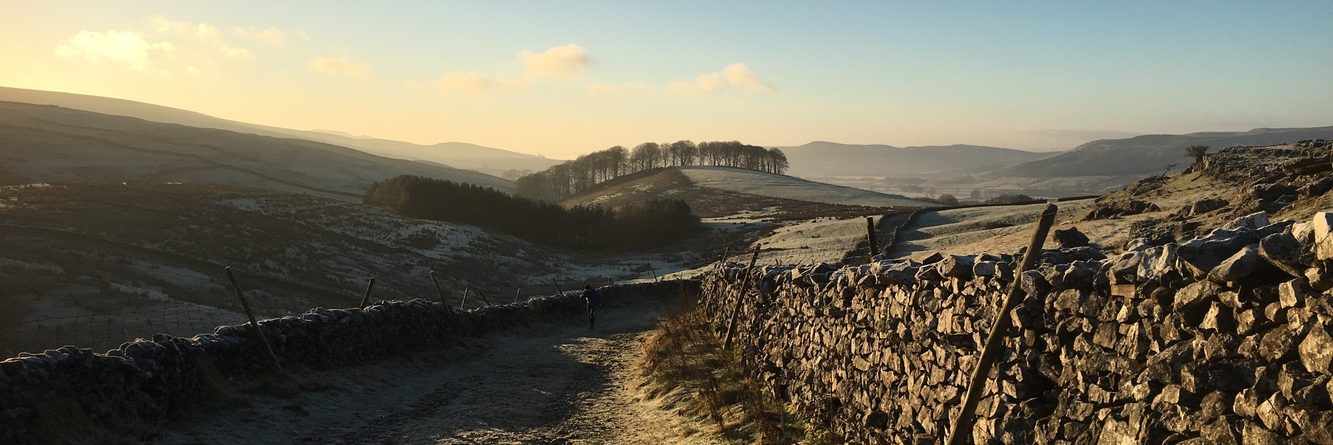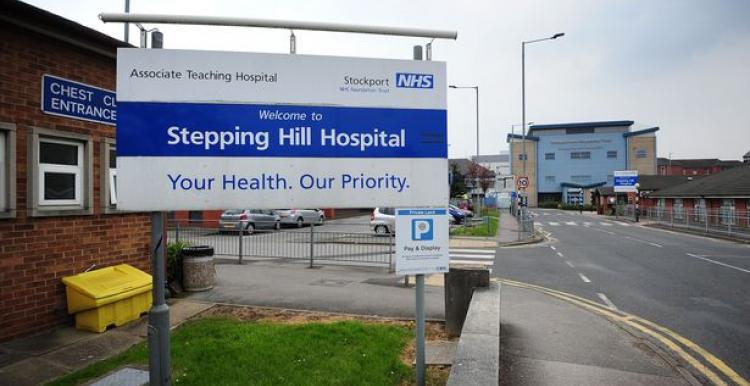There are some posts I make on here that I look forward to writing. Others, I write because I feel I need to get an important message out. This one falls firmly into the second category. Nor is this going to be an easy post to write; I have an ever increasing number of questions but many fewer answers. Questions about what I did, what I maybe should have done, what I knew and what I didn’t know.
The race that was
You’ll probably be aware that I took part in an ultramarathon at the weekend. There’s a blog post about it here and I covered the 45 miles of the Pendle Way in a tad under 13.5 hours. I throw the numbers in here because we’ll need them a bit later. You’ll possibly also be aware that this isn’t my first ultra, I’ve done about eight since I started doing the longer stuff in 2018 and tend to keep them few and far between because it takes a lot out of the body. This one sat bang in the middle of them all in terms of distance and elevation. So not an outlier based on what I could see. In addition, I was familiar with 2/3rd of the route (albeit in reverse) having done an event here last summer (in much warmer and drier conditions). So whilst that’s not a huge number I feel I have enough experience to look out for myself.
Or at least I thought I did.
18 hours after finishing the race I was fast-tracked through the Emergency Department (A&E) at my local hospital for treatment for Rhabdomyolysis.
Rab-what?
Rhabdomyolysis, or Rhabdo as it’s more commonly known is a very serious condition. Muscles that have become damaged get broken down into their constituent components and end up in the bloodstream, but they’re too large for the kidneys to deal with. Left untreated the kidney function is blocked with the potential risk of permanent kidney damage or even renal failure.
It is assessed by measuring the volume of Creatine Kinase (CK) present in the blood (for men it should be no more than about 200-300u/l) and whether myoglobin is present in the urine (it shouldn’t be).
The treatment, assuming it’s started in time, involves flushing the bloodstream with intravenous fluids out flush the detritus and ultimately restore kidney function so the body can get back to normal again. Assuming treatment is effective, the impact of Rhabdo is reversible.
Rhabdo can be caused by multiple factors, normally linked to muscle trauma which results in the breakdown. However, we’re looking at extertional rhabdo here, which tends to be more regularly linked to high-intensity exercises e.g. HIIT, weight-lifting, fast-twitch alactic stuff. The literature tends to point to doing lower intensity stuff for longer to reduce the risk. However high-extertion on the muscles by whatever means can result in the condition.
Symptoms
There are some classic symptoms of Rhabdo, but what emerges can depend on time since the injury, circumstance of the injury and other non-specific factors. The main ones being
- Muscle pain in the shoulders, thighs, or lower back
- Muscle weakness or trouble moving arms and legs
- Dark red or brown urine or decreased urination
In addition, nausea, vomiting, confusion, rapid pulse and fever may be present.
Saturday’s race
With the benefit of hindsight, I can see a number of these symptoms during the race.
I was aware of the darkened urine at just before checkpoint 1 (16 miles) which is something rather strange because I had been running that sort of distance during January without issue. Actually dodgy innards are a common thing for me when I’m running longer distances. I don’t usually experience the darkened urine, but it has happened once before and I got it checked out and all was fine.
Next, I remember feeling really weak as I was using my running poles climbing out of Earby. I presumed I was just unfit with the poles as I’d not used them in a long time, but equally “muscle weakness” in the arms could be another symptom.
I was also aware that I felt a little ‘out of it’ when I was at the third checkpoint at Coldwell. That said, having covered 29 miles by CP3, feeling tired and achy would not be a surprise as the route is challenging especially when wet underfoot. But I definitely felt more tired than I expected to be.
At the very end of the race I felt I had given absolutely all I had. However the final couple of miles over Pendle Hill were very testing, so again, hard to necessarily isolate whether this was a medical reason or just the culmination of a long and challenging day out. Indeed having sat down and had a couple of cups of coffee, my urine colour was much more normal (albeit probably still too dark) and I felt OK. Knackered yes, but OK. Again in hindsight, I was possibly more exhausted than I ‘should’ have been, but I’ve never done the race before so it’s difficult to benchmark exactly.
The following morning I still felt shattered, but my feet had been really sore overnight so I had not slept well (again, not unusual for me after an ultra). My urine looked relatively ‘normal’ although I thought it still looked a little more pink than it ought. I drank plenty of fluids in the morning whilst I got my race kit through the washer, and contacted the NHS helpline for advice because the symptoms I’d exhibited yesterday during the race were bothering me.
That started a chain of events which resulted in my admission to hospital for treatment for Rhabdo. I will add that at this point I didn’t feel unwell; Indeed I was totally surprised when I was told I needed to be admitted to hospital and that I was seriously unwell. However Rhabdo is progressive as the kidneys are increasingly compromised over time and so if they weren’t treated immediately more symptoms may well have followed.
There’s actually a really interesting case study which describes a far more serious case of Rhabdo where the patient’s CK load was significantly higher than mine (which topped out at 4100U/L) and where the physical symptoms were very obvious.
More questions than answers
So the burning question is ‘why’? And it’s not an easy one to answer. It could be a simple matter of conditioning as my training block for the event had been adversely affected with the bursitis problem in my heel last summer. As such I didn’t get running regularly until last October, and wasn’t able to as get many longer runs done than I would have wanted. That said, my overall fitness was doing OK.
My thoughts are therefore:
- Was this caused just on race day, or was there something underlying? i.e. some factor I was (and still am) unaware of which tipped the situation over the edge and made what was intended to be a lower-effort workout somewhat high-effort. Interestingly, when I checked my garmin after the event to try to answer this question, it appeared not to have recorded any HR data for the race. I’ve no idea why this was the case as I’ve since checked the watch and that function is turned on.
- Did the hamstring issue from the previous week have any bearing on this? Seems unlikely to me, but I can’t be 100% sure.
- Had I done more long training days would this have been avoided? This is the only part of my lead-up which I feel could have been improved. That said, I had altered my expectations of the event and set out to walk it rather than run it because I hadn’t been able to put in that extra amount of training. Had I done more, I would have pushed harder.
- Should I have stopped immediately when I first saw the discoloured urine? Would that have made any difference to the overall outcome, given at that point the distance covered was within what I’d been doing in the weeks approaching the race?
- Assuming it was reasonable to continue then, at what point should I have abandoned the race, if at all? Ultimately there was no show stopper sign to suggest there was anything majorly wrong and most of the signs I’m really pulling together after the event.
Talking with the medical staff didn’t really glean a huge amount of answers. They thought the idea of a 45 mile event was excessive and that I probably shouldn’t be doing that sort of thing – “remember Simeon, you’re not 25 any more“. The distance & time involved was visibly beyond what they could comprehend anyone doing. But this is in part due to the disconnect we ultrarunners have with the rest of the world. My running friends will go out and run/walk anything from 20-50 mile events really without giving it a second thought. It’s what we do.
It’s also worth noting that the doctors did additional scans on my abdomen to double check there wasn’t an unrelated factor at play that might have actually been the root cause; that all came back clear, although one look at my “runners feet” left them with other concerns (blood tests on that front still outstanding)!
It’s possible with hindsight to say that I shouldn’t have even started the race, maybe stayed in bed and not left the house. This naiively overlooks the fact that we experience ups and downs in life regardless, and ignores the mental health benefit I achieve by going out and tackling such events. They’re not expected to be easy, that’s fundamentally one of the reasons that I seek out events like this, to find out what I am capable of. Sitting at home in front of a TV showing Celebrity-Get-Me-Out-Of-Stars-On-The-Love-Factor-ad-nauseum will never meet that need for me. (if that’s you, more power to your elbow, we’re all different).
Conclusion
There was always a risk of beating myself up about what I should or shouldn’t have done, but the reality is that it doesn’t achieve anything useful to anyway. So with that in mind, the purpose of writing this was two-fold.
Firstly, I am trying to understand what happened so that I can hopefully avoid it happening again. Whilst the A&E staff at Stepping Hill hospital were totally first class with my treatment, it irks me that I shouldn’t have ended up in that predicament. My gut feeling is that more training would have made the race easier, but then I’d have pushed harder. So would the result be any different?
Secondly, not many runners I know have heard of Rhabdomyolysis, so this is my opportunity to get the message out. By chance I had heard via US ultrarunner John Kelly’s blog post last year when he experienced symptoms and that knowledge was probably the reason I rang the NHS for advice in the first place. To be clear, I had set about rehydrating my system anyway but the fact that the doctors had me on a IV drip within a couple of hours of my arrival at A&E suggests that my own efforts were not have adequate to avoid more serious illness.
It’s now 72 hours since I was allowed home and I’m still exhausted, although that is in part due to a cold I probably picked up whilst in the hospital. I’ll be taking things easy for a little while yet; in theory I have one more pre-booked race left, but in practice getting my health straight (and keeping it there) is far more important.
I hope that was useful. Any questions please ask below.


Leave a comment